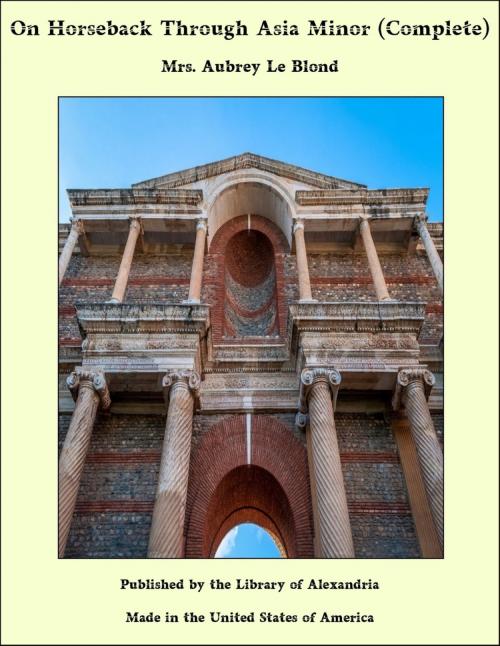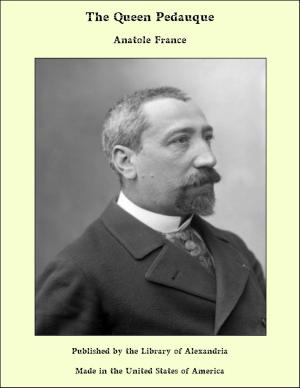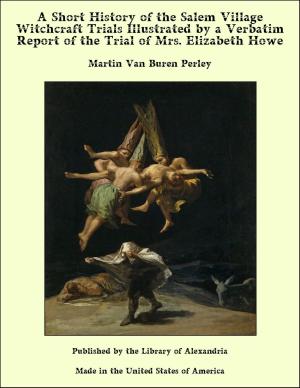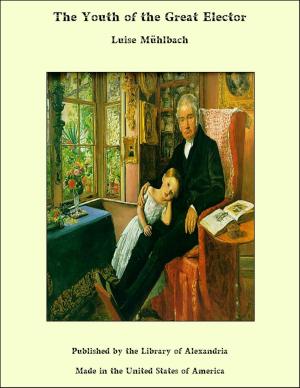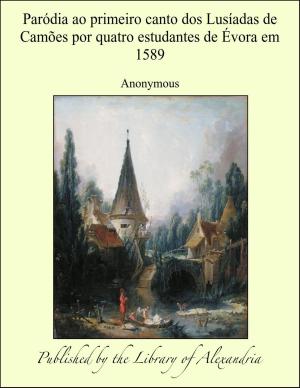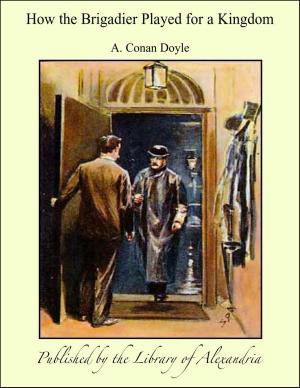On Horseback Through Asia Minor (Complete)
Nonfiction, Religion & Spirituality, New Age, History, Fiction & Literature| Author: | Mrs. Aubrey Le Blond | ISBN: | 9781465625113 |
| Publisher: | Library of Alexandria | Publication: | March 8, 2015 |
| Imprint: | Language: | English |
| Author: | Mrs. Aubrey Le Blond |
| ISBN: | 9781465625113 |
| Publisher: | Library of Alexandria |
| Publication: | March 8, 2015 |
| Imprint: | |
| Language: | English |
It was the autumn of 1876: I had not as yet determined where to spend my winter leave of absence. There was a great deal of excitement in England; the news of some terrible massacres in Bulgaria had thoroughly aroused the public. The indignation against the perpetrators of these awful crimes became still more violent, when it was remembered that the Turkish Government had repudiated its loans, and that more than a hundred millions sterling had gone for ever from the pockets of the British tax-payer. This was very annoying. We were on the eve of an important election. Some people declared that our Government might have prevented the massacres in Bulgaria; others, that an ostentatious protection had been shown to Turkey, and that Europe had been wantonly disturbed through the instrumentality of our Ministry. Illustrious statesmen, who were solacing themselves after the toils of the session, by meandering through the rural districts on bicycles, or by felling timber in sylvan groves, hurried up to town. Two letters appeared in the columns of the leading journal signed by gentlemen belonging to the Church of England, saying that they had seen Christians impaled by the Turks. Pamphlets were written and speeches made in which the subjects of the Sultan were held up to universal execration. Several distinguished Russians, who happened at that time to be in England, threw oil on the flames which had been kindled. Ladies, like Madame de Lievens, of whom the late Duke of Wellington wrote, went from salon tosalon and extolled the Christian motives of the Tzar. This feminine eloquence proved too much for a few of our legislators, who, like Lord Grey in the year 1829, entertained some old opposition opinions of Mr. Fox's, that "the Turks ought to be driven out of Europe." It was difficult to arrive at the truth amidst all the turmoil which prevailed. Were the Turks such awful scoundrels? Had the reverend gentlemen, to whom I have already alluded, really seen Christians impaled, or were these clergymen under the influence of a hallucination? There was one way to satisfy my own mind as to whether the subjects of the Porte were so cruel as they had been described. I determined to travel in Asia Minor; for there I should be with Turks who are far removed from any European supervision. Should I not behold Christians impaled and wriggling like worms on hooks in every high road of Armenia, or find an Inquisition and a weekly auto da fé the amusement of the Mohammedans at Van? Judging from the pamphlets which were continually being written about the inhuman nature of the Turks, this was not at all improbable. I should also have the opportunity of seeing something of the country between the Russo-Turkish frontier and Scutari. It was the beginning of November. My leave of absence would commence towards the middle of the month. It was time to make preparations for the journey. On this occasion I determined to take an English servant, a faithful fellow, who had been with me in many parts of the world.
It was the autumn of 1876: I had not as yet determined where to spend my winter leave of absence. There was a great deal of excitement in England; the news of some terrible massacres in Bulgaria had thoroughly aroused the public. The indignation against the perpetrators of these awful crimes became still more violent, when it was remembered that the Turkish Government had repudiated its loans, and that more than a hundred millions sterling had gone for ever from the pockets of the British tax-payer. This was very annoying. We were on the eve of an important election. Some people declared that our Government might have prevented the massacres in Bulgaria; others, that an ostentatious protection had been shown to Turkey, and that Europe had been wantonly disturbed through the instrumentality of our Ministry. Illustrious statesmen, who were solacing themselves after the toils of the session, by meandering through the rural districts on bicycles, or by felling timber in sylvan groves, hurried up to town. Two letters appeared in the columns of the leading journal signed by gentlemen belonging to the Church of England, saying that they had seen Christians impaled by the Turks. Pamphlets were written and speeches made in which the subjects of the Sultan were held up to universal execration. Several distinguished Russians, who happened at that time to be in England, threw oil on the flames which had been kindled. Ladies, like Madame de Lievens, of whom the late Duke of Wellington wrote, went from salon tosalon and extolled the Christian motives of the Tzar. This feminine eloquence proved too much for a few of our legislators, who, like Lord Grey in the year 1829, entertained some old opposition opinions of Mr. Fox's, that "the Turks ought to be driven out of Europe." It was difficult to arrive at the truth amidst all the turmoil which prevailed. Were the Turks such awful scoundrels? Had the reverend gentlemen, to whom I have already alluded, really seen Christians impaled, or were these clergymen under the influence of a hallucination? There was one way to satisfy my own mind as to whether the subjects of the Porte were so cruel as they had been described. I determined to travel in Asia Minor; for there I should be with Turks who are far removed from any European supervision. Should I not behold Christians impaled and wriggling like worms on hooks in every high road of Armenia, or find an Inquisition and a weekly auto da fé the amusement of the Mohammedans at Van? Judging from the pamphlets which were continually being written about the inhuman nature of the Turks, this was not at all improbable. I should also have the opportunity of seeing something of the country between the Russo-Turkish frontier and Scutari. It was the beginning of November. My leave of absence would commence towards the middle of the month. It was time to make preparations for the journey. On this occasion I determined to take an English servant, a faithful fellow, who had been with me in many parts of the world.
